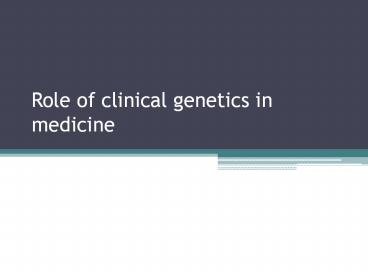Role of clinical genetics in medicine - PowerPoint PPT Presentation
1 / 23
Title:
Role of clinical genetics in medicine
Description:
Phenotypic and pattern recognition. Individual patient research. Appropriate investigation ... Herceptin for Ca breast with ERBB2 over expression. Clinical Genetics ... – PowerPoint PPT presentation
Number of Views:509
Avg rating:3.0/5.0
Title: Role of clinical genetics in medicine
1
Role of clinical genetics in medicine
2
Who provides this service
- Varies depending on structure and funding of
service but is in reality provided by many
different individuals - Medical genetic staff
- Physicians and surgeons with a special interest
- Nurses with a special interest
- Obstetricians
- General practitioners
3
Clinical Genetic Service
- Cytogenetic laboratory
- Molecular genetic laboratory
- Clinical genetics
4
Clinical Genetics
- Diagnosis of genetic disorders
- Provide information to individuals and families
about the genetic disease affecting their family - Clinical surveillance of individuals at risk of
genetic disease - Coordination of screening of at risk individuals
- Laboratory liaison
- Education
5
Clinical genetics
- Mainly an outpatient speciality
- Patients seen
- In clinic
- At home
- On the ward
6
Diagnosis
- May be known prior to the appointment and
inheritance of condition in the family known - May be made in clinic from history and
examination - May be unknown but pedigree analysis may help in
establishing risks
7
Diagnosis
- Clinical geneticists are specifically trained to
recognise genetic disease through - Pedigree analysis
- Phenotypic and pattern recognition
- Individual patient research
8
Appropriate investigation
- Appropriate investigation of complex disorders as
a result of phenotypic and pattern recognition of
the individual and family - Use of medical genetic databases
- Knowledge on available genetic testing
9
Diagnosis of genetic disease
- Each genetic disease is rare and genetic
practitioners are more likely to recognise a
condition because they may have seen it or have
read about the condition before - Physicians and surgeons with a special interest
may also have extensive knowledge of a particular
group of genetic conditions
10
The process
- Taking the family tree
- Collecting the medical history in detail
- Examination of the affected or at risk individual
if appropriate
11
Surveillance
- Knowledge of disorder allows appropriate clinical
surveillance of individuals at risk of genetic
disease - Development of guidelines for the management of
individuals at risk - Coordination of screening of at risk individuals
12
Providing the information
- Non directive
- Non judgmental
- Fully informative
13
Clinical counselling
- Affective communication with family about the
natural history and prognosis of genetic disease - Provide risk information for relatives including
offspring - Prenatal/antenatal counselling
- Provide support for individuals and families with
genetic disease
14
Genetic Counselling
- An educational process that seeks to assist
affected and/or at risk individuals to understand
the nature of the genetic disorder, its
transmission and the options open to them in
management and family planning - Kelly 1986
15
Genetic counselling
- Genetic counselling is the process by which
patients or relatives at risk of a disorder that
may be hereditary are advised of the consequences
of the disorder, the probability of developing or
transmitting it and of the ways in which this may
be prevented, avoided or ameliorated
16
Associate/nurse led clinics
- Tend to be disease specific
- Provide information about the risks and natural
history, including complications - Work to frequently reviewed guidelines
- Provide emotional support for individuals and
families with genetic disorders
17
Providing support
- Support and counsel individuals considering and
during genetic testing - Diagnostic
- Predictive
- prenatal
- Provide bereavement and post termination
counselling - Ensuring families receive available services and
benefits
18
Clinical Genetics - laboratory
- Clinical support for cytogenetic and molecular
genetic laboratories including the
interpretation of results in the clinical context - Liase with other clinicians using genetic
laboratory services
19
Pharmacogenetic
- Currently clinical genetic departments are rarely
involved, however this may change as more sub
typing of disease and individuals becomes possible
20
Pharmacogenetics
Disease susceptibility
Focused screening
Early Diagnosis
Targeted therapy
21
Pharmacogenetics
Clinical diagnosis
Biochemical diagnosis
Genotype diagnosis Somatic or germline
22
Genotype diagnosisPredicting drug response
- Diabetes
- HLA, HNF1a and 4a, PPAR, glucokinase
- e.g. sulphonylurea very affective in HNF1a
- Asthma
- IGE receptor, airway remodelling, epithelial
barrier (protease) - Cancer
- Imantinib active against tumours with activated
KIT mutations (GISTs), 82 response rate - Herceptin for Ca breast with ERBB2 over
expression
23
Clinical Genetics
- Diagnosis of genetic disorders
- Provide information to individuals and families
about the genetic disease affecting their family - Clinical surveillance of individuals at risk of
genetic disease - Coordination of screening of at risk individuals
- Laboratory liaison
- Education































